Remembering the life of a Muslim and matriarch
By Starla Muhammad -Managing Editor- | Last updated: Oct 4, 2017 - 1:51:13 PMWhat's your opinion on this article?
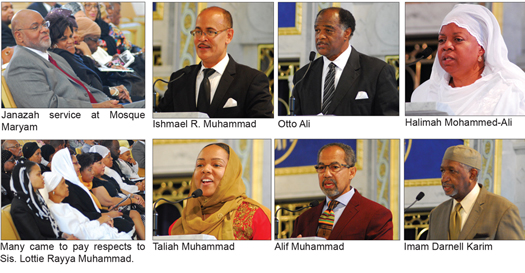
|
CHICAGO—Muslims from around Chicago and surrounding areas gathered with friends and family to pay respects and honor the life and legacy of Nation of Islam pioneer Sister Lottie Rayya Muhammad, daughter of the Honorable Elijah Muhammad and Mother Clara Muhammad.
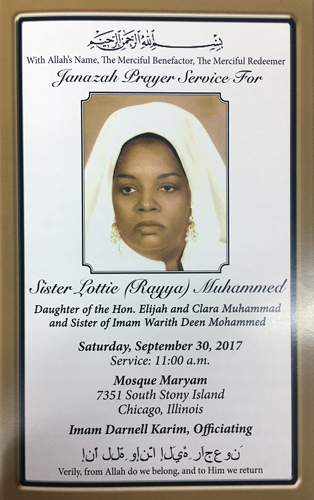
|
The Honorable Minister Louis Farrakhan expressed his condolences and shared his fond memories of Sister Lottie Rayya Muhammad with The Final Call.
“My family and I were saddened by the news of Sister Rayya Muhammad’s transition. My family and I owe Sister Rayya Muhammad a debt of gratitude for her kind and loving and nurturing of Mother Khadijah, myself and my children, with the wisdom and guidance of her father when she was M.G.T. Captain and beyond.
She always received us with love and compassion and she was always full of the knowledge and history of the Messenger and the Nation which she so gladly shared with us when we visited her home.
My children and the Messengers younger children always would find a refuge within the home of Rayya Muhammad. May Allah grant her a place in the Hereafter and the reward of her faithfulness through her children and grandchildren and to the community that she loved and served,” the Minister shared.
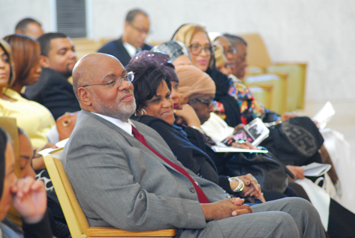
Janazah service at Mosque Maryam
|
“These great soldiers of Allah and pioneers will never be forgotten,” said Student Min. Ishmael Muhammad.
Student Supreme Captain Mustapha Farrakhan, Louis Farrakhan Jr. and Student Minister Donna Farrakhan Muhammad attended services on behalf of their parents and family.
Ahmad Muhammad, Rasul Muhammad and Abdullah Yasin Muhammad, younger siblings of Sister Lottie were also in attendance.
“Granny was my first role model,” Taliah Muhammad shared with those who gathered to pay their respects. The stories her grandmother would often share about the early establishment of Islam helped Taliah develop and become who she is today. “She became my very first hero. This was a true example of a Muslim woman,” said Taliah Muhammad.
Those same stories, said Sister Lottie’s daughter Halimah Mohammed-Ali, included sharing what she remembered about her father’s teacher. Sis. Lottie was only six-years-old when Master Fard Muhammad, the Great Mahdi and founder of the Nation of Islam met her parents in 1931 in Detroit.
As a little girl, Sister Lottie would often listen to Master Fard Muhammad and her father talk and as she grew older, she would share those stories with her family and the Muslim community, said Halimah Mohammed-Ali.
Alif Muhammad, a nephew of Sister Lottie shared how he met his now wife of over 40 years, Maria Farrakhan for the very first time in his aunt’s home. “She was a lady who loved being a lady. She was a leader in our community. I want us to remember the pioneers. She was one of the first pioneers,” said Alif Muhammad.
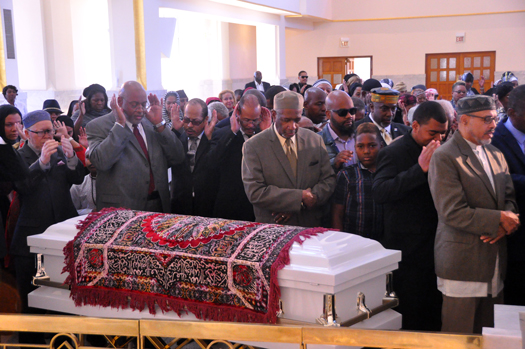
Muslim men perform prayer during services for Sis. Lottie Rayya Muhammad at Mosque Maryam on Sept. 30. Photo: Abdul K. Muhammad
|
Otto Ali a childhood friend of Sis. Lottie’s children called her a Muslim who was also a matriarch and reflected on her tenure as the longtime Dean of Girls at Muhammad University of Islam, the independent educational and school system established by the Hon. Elijah Muhammad. Sis. Lottie served as dean for 16 years in Chicago, training and cultivating young, Muslim girls in areas of etiquette, behavior and hygiene. Prior to that, in the mid-1950s she was appointed National M.G.T. and G.C.C. Captain by her father, placing her in charge of the women’s class in the Nation of Islam.
“She was a dean and she was always there to make sure that they were on the straight and the narrow,” said Otto Ali speaking about Sis. Lottie’s tenure as dean.
In a touching tribute near the end of services, Imam Darnell Karim who officiated, raised his hand to his temple in a salute as he recited the names of the children of the Hon. Elijah Muhammad and Mother Clara Muhammad whose lives and contributions should be remembered including: Ethel Sharrieff, Imam Warith Deen Mohammed, Nathaniel, Akbar, Jabir (Herbert), Lottie (Rayya), Emmanuel and Elijah Jr., who is still living.
It was Sister Lottie’s tenure as Dean of Girls where her far reaching impact on the lives of young, girls was also felt. Several of her former students came to pay their respects. “Stern but loving,” was how they described her.
“Sister Lottie was strict but she was very beautiful. When people say ‘you dress so well and your character and everything’ I have to say that came from Sister Lottie. That was my beginning,” said Sharon Ali, a former student.
“I got in trouble a couple of times,” she continued, laughing as she reminisced. She shared a story from an incident that happened when she was about 13 years old. “So, when I came down with the girls, she reprimanded me but at the same time said, ‘what are you doing down here’ because she just knew that wasn’t my character.”
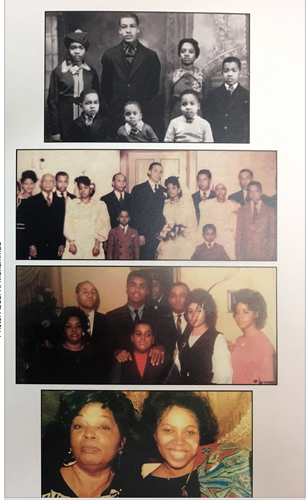
|
Hanan Hicks was born and raised in Chicago and grew up in the Nation of Islam and was also a student from kindergarten through high school at the university during the 1960s when it was located on 53rd and Greenwood prior to moving to its current location on 73rd and Stony Island.
She was always a role model for all of the sisters, said Ms. Hicks. “I particularly remember when she did a spontaneous check on us on hygiene and that was something that Sister Rayya kept expressing to the girls, to always stay clean. Not just mentally but also physically. She would do a spot check on your bra to make sure you were clean!” reflected Ms. Hicks. She said as a youngster she thought it was a bit odd.
“But you know what? We fell in line and we made sure that we stayed clean. … She didn’t do any spanking but it was her words to us that made us stand correct,” said Ms. Hicks.
“Sister Lottie was the epitome of a Muslim woman and femininity. She always reminded us about taking care of ourselves as females. She would always say, ‘don’t put your hands on your face.’ She had the most beautiful scent. When she would leave a room, she would leave a scent behind and when she wore her uniform, everything was impeccable and in order, not a fabric or anything out of place,’” said Jamillah Omar, 55 also a former student during the late 1960s and early 70s. Sister Lottie was very strong, but kind and loving, she added.
As a young Muslim with no background in education, when Agnita Rasul Byrd moved from Connecticut to Chicago in the 1960s to work at the university, it was a culture shock being in a large city. Ms. Byrd also served as principle at the school from 1966-69. When she first moved to Chicago, Ms. Byrd said her apartment was not ready yet so she lived with Sis. Lottie for a time.
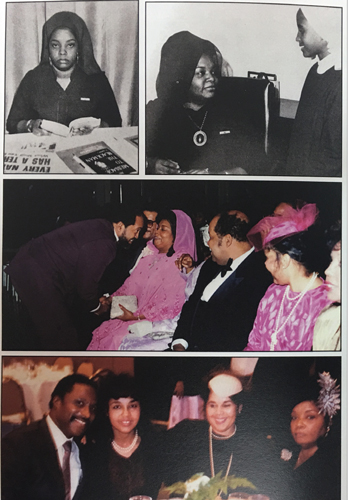
Photos from funeral program showing Sis. Lottie Rayya Muhammad with members of her family. Sis. Lottie was the daughter of the Honorable Elijah Muhammad and Mother Clara Muhammad.
|
“When I heard that she passed I just had to put everything aside. I said ‘I have to make it, no matter what I’m doing, no matter what.’ I just loved her.”
For Zarinah Shakir, meeting Sis. Lottie was like a dream come true. “She was guided by the teachings of her father and applied them to her family as well as all parts of her life,” she told The Final Call. “I met her while I was living in Chicago. I knew her and her daughter Halimah. She was very much a worker and that’s what I remember most about her. She was also a good dresser. She was part of our royal family and all the sisters loved her,” said Ms. Shakir.
“I also lived in San Francisco and I was so happy to see her there as well as all the Saviours’ Day Conventions. Sis. Lottie always had a smile on her face. She was very calm and involved in the community.”
While Sis. Lottie was National M.G.T. Captain, her duties took her to Philadelphia to visit the sisters’ class there under the leadership of Intisar Shareef, who had been an administrator at Temple University’s Afro Asian Institute which pre-dated Temple’s African American Studies program. She was introduced to Sis. Lottie by Philadelphia’s then Minister Jeremiah Shabazz.
“She was my superior and became somewhat of a mentor to me,” said Ms. Shareef. “She taught me how to be an effective leader. She taught me nutrition, food preparation, hygiene and child care. She taught me to be careful with my words, how to engage with the sisters, how to be restrained, organized and how to be attractive,” she added.
“She would say that you represent the women in the Nation of Islam and you also want to attract women to the Nation of Islam. Her charm and wit was most memorable. She was very beautiful.”
Lottie Rayya Muhammad was born January 3, 1925 in Detroit, Mich. and was the third of eight children born to the Hon. Elijah Muhammad and Mother Clara. She was educated along with the other children of the early Muslims in the homes of various sisters and locations where the Nation’s temples—as they were called at the time—were located.
She married Wali Muhammad, an early follower of the Hon. Elijah Muhammad, and four children resulted from their union. Their son, Wali Fard Muhammad, affectionately called “The Communicator,” preceded her in death. Sis. Lottie is survived by her son Ameer, two daughters, Ayesha and Halimah, 19 grandchildren and 18 great-grandchildren.
(Nisa Islam Muhammad contributed to this report.)
INSIDE STORIES AND REVIEWS
-
-
About Harriett ... and the Negro Hollywood Road Show
By Rabiah Muhammad, Guest Columnist » Full Story -
Skepticism greets Jay-Z, NFL talk of inspiring change
By Bryan 18X Crawford and Richard B. Muhammad The Final Call Newspaper @TheFinalCall » Full Story -
The painful problem of Black girls and suicide
By Charlene Muhammad -National Correspondent- » Full Story -
Exploitation of Innocence - Report: Perceptions, policies hurting Black girls
By Charlene Muhammad -National Correspondent- » Full Story -
Big Ballin: Big ideas fuel a father’s Big Baller Brand and brash business sense
By Bryan Crawford -Contributing Writer- » Full Story






 Click Here Stay Connected!
Click Here Stay Connected!








